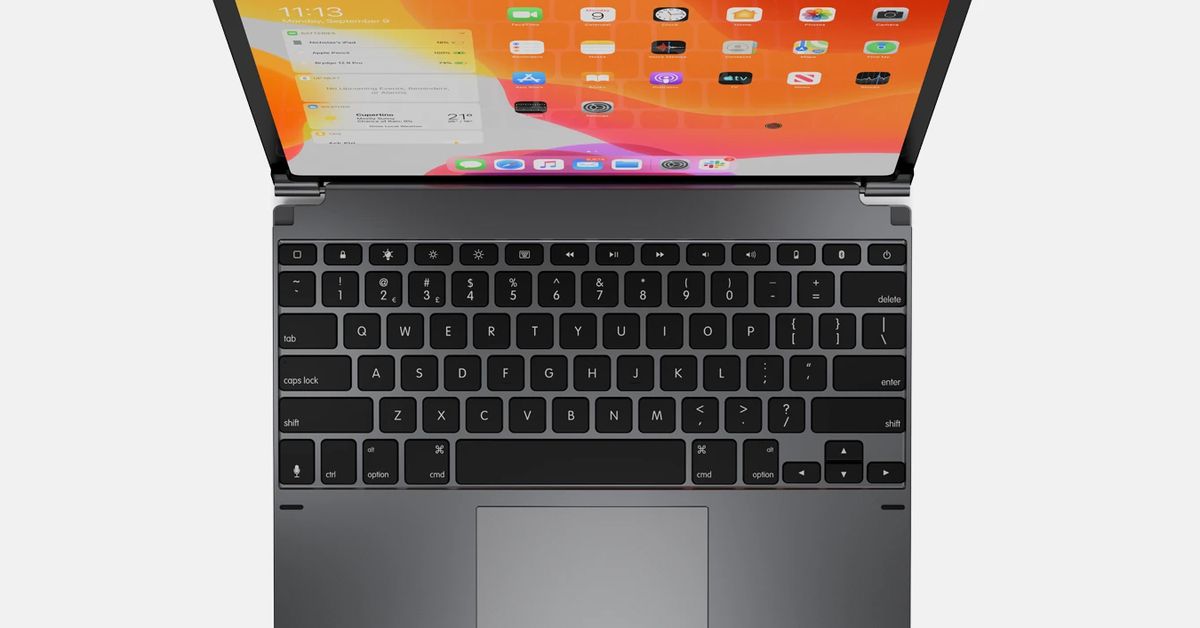Good morning and congratulations on making it through another week. I had been planning on writing about some of the issues I had while writing my Samsung Galaxy S20 Ultra review — specifically my bafflement that Samsung is once again asking reviewers like me to be beta testers. It’s inconceivable that the company didn’t realize there were issues with the camera and also very strange that it didn’t so much as hint at a software update to me until the day before yesterday. I’ll say it again: never buy anything on the hope that future software updates will fix it. Wait.
But we covered it pretty well in The Vergecast coming out later today, so please give it a listen. Instead, to the surprise of absolutely nobody given my obsession with how companies are trying to get big-screen computers beyond the UX paradigms of the 1980s and 90s, I’m interested in an iPad rumor about a keyboard.
The news is simply that Apple is reportedly releasing an iPad keyboard with a trackpad later this year. It’s a good scoop from The Information. A good piece to read next is about something Jason Snell noticed in the iOS beta released earlier this month: better support for keyboard functions like modifier keys. A third thing to note is that Apple software boss Craig Federighi said, “If you like what you’ve seen us do with iPadOS, stay tuned, we’re going to keep working on it.”
If you’re wondering when this might happen, the Apple-o-sphere has all been working on the belief that Apple will be holding a Spring hardware announcement. There are too many rumored products to fit into one event, but a new iPad Pro and a new keyboard for it would definitely make the cut. Given all the recent tech event cancellations due to the coronavirus, however, Apple might be rethinking its plans right now.
In any case, I have many thoughts about the iPad — which you might have guessed since I’ve been writing about the iPad’s evolution as a computer so often over the past few years. I would love to speculate on the physical shape and design of the keyboard, but I think that’s better left until later, when we have a better idea of what it might look like.
Instead, I just want to point out that the iPad is an OS that is currently hostile to mouse input. I don’t mean that as a criticism, but I do think it’s just stating facts. I know there are people who have enabled the “AssistiveTouch” mouse feature, but what it mainly does is let you emulate your finger taps with a mouse. That means it’s not actually all that helpful with two things that mice excel at: tapping tiny UI buttons and working with text.
I’m on record as thinking that Apple’s recent attempts to improve text manipulation like selecting, copying, pasting, and even cursor placement are not very good. And since AssistiveTouch currently only supports acting like a finger, it doesn’t help.
I bring this up because I have a radical idea: what if the only thing trackpad support brings to the iPad is better text manipulation? I actually think that is the right move for Apple, at least to start.
With the new iPadOS last year, Apple was incredibly ambitious. It added all sorts of new ideas and interaction models to the UI, some of which were confusing. In my original review, I gave Apple credit for finally allowing the iPad to become complicated and I stand by that. But I also believe that it’s not intuitive because its features can’t be progressively learned over time — you basically have to watch or read tutorials, which is incredibly un-Apple-like.
I bring all this up because right now the iPad has a lot going on with its overall user interface and I sort of feel that the last thing Apple should do is add yet another variable to the mix. Unless Apple is planning its second major re-think of how we interact with the iPad in two years, it’s just too much of a burden to put on users.
Because, as I’ve said before, using a mouse is fundamentally a weird thing to do — it’s actually a level of abstraction beyond just touching the display. It only feels “intuitive” because so many of us learned to use one first, and because “desktop” operating systems do such a good job of progressively teaching you new skills as you use them. They’re consistent and learnable in a way the iPad’s more advanced features simply aren’t.
I don’t want Apple to fall back on the crutch of just using desktop OS paradigms to solve the iPad’s user interface intuitiveness problem. The last thing we should want is for the iPad to turn into a Mac. It’s on a different path and it would be a shame to have those ideas tossed out the window just so we can have more traditional windows on the iPad.
But I’m not anti-trackpad. I do think it would be a huge help for text selection and it would allow some app developers to create smaller touch targets on their apps. Plus, and this may be anathema to some, the iPad makes a lot of use of right-click style actions now (just long press to see them), and a trackpad could help with that too.
If you haven’t done so in awhile, go on and watch Steve Jobs’ seminal iPhone introduction. Pay special attention to how he talks about styluses and fingers. It’s easy to forget now, but the iPhone was a radical reinvention of user interfaces compared to what most people had used. Only a tiny sliver of apps on smartphones were designed to be used with a finger — shout out to SnapperMail, my favorite email app for the Treo and the subject of a wonderful 2003 Walt Mossberg review.
None of the smartphone operating systems before the iPhone were optimized for fingers, though. They all required a stylus or physical buttons to get around. The iPhone UI was revolutionary because it just had one button — the home button — and it was designed from the ground-up to be touched.
The iPad continued that legacy, just on a big screen. Adding a trackpad to that seems like a good idea, but I dearly hope it doesn’t take away from all the benefits we get from a purely touchscreen interface. We already have the Mac, the iPad doesn’t need to turn into one too.
Coronavirus
┏ Facebook cancels F8 developer conference due to coronavirus concerns.
┏ Plague Inc. pulled from the App Store in China amid coronavirus outbreak.
In late January, Plague Inc. saw a resurgence in downloads in China and became the country’s top paid iOS game. In response, Ndemic Creations released a statement reminding players that Plague Inc., while it was designed to be realistic and informative about how diseases spread, is just a game. It’s currently the top paid game in the US App Store. “We would always recommend that players get their information directly from local and global health authorities,” the company said in January.
┏ Tim Cook says Apple is reopening factories as China gets ‘coronavirus under control’.
┏ Health secretary Alex Azar won’t promise that a coronavirus vaccine would be affordable.
┏ Coronavirus merch is somehow worse than I expected.
More from The Verge
┏ Samsung Galaxy S20 Ultra review: shutter bug. Here’s my review. I hope Samsung bucks the trend of camera software updates usually not improving things.
Samsung called this phone the S20 instead of the S11 to indicate that it is the first of a new generation, and that might be too revealing. As impressive as the overall phone is, the camera often acts like a first-gen tech product with first-gen tech problems.
┏ Robots aren’t taking our jobs — they’re becoming our bosses. Important, deep piece from Josh Dzieza. Well written and empathetic. Think of all the tiny moments of downtime you have during the day, the time where you’re just with yourself for a minute. AI tracking of workers is taking that away.
An Amazon worker in the Midwest described a bleak vision of the future. “We could have algorithms connected to technology that’s directly on our bodies controlling how we work,” he said. “Right now, the algorithm is telling a manager to yell at us. In the future, the algorithm could be telling a shock collar—” I laughed, and he quickly said he was only partly joking. After all, Amazon has patented tracking wristbands that vibrate to direct workers, and Walmart is testing harnesses that monitor the motions of its warehouse staff
┏ It’s hard to care about other people’s feelings online. I love this essay from Bijan Stephen. Acting with empathy on platforms that reward snark is hard and you often end up looking painfully earnest. But do it anyway.
┏ Vivo’s Apex 2020 concept has breakthrough cameras and an ultra-curved screen. As Sam Byford notes, this phone was supposed to be shown at Mobile World Congress. Hopefully Vivo seeds it to some people to play around with even though it’s never going to get released, because I would love to see the results of some independent tests of a proper optical zoom lens on a phone:
The Apex 2020’s telephoto lens, however, has actual moving lens elements that take it from 5x to 7.5x magnification. Vivo says the 16-megapixel module is just 6.2mm thick due to its periscope design, which allows it to fit inside the 8.8mm-thick phone.
┏ Uber tweaks its app to improve those pesky pickups. This is a very smart idea, though it does mean that drivers’ phones will have their microphones turned on. If I were Uber, I would get an independent auditor to go through the code every now and then to verify that the only thing the microphone is doing is listening for the ultrasound.
Uber is also developing a new technology that uses ultrasound waves to automatically verify you’re in the right car, no PIN needed. The rider’s phone will send this ultrasonic signal to the driver’s phone to automatically verify the unique PIN. The company has said that technology should be ready to roll before the end of 2019.
┏ Clearview AI’s client list includes 2,200 organizations spanning law enforcement to universities.
┏ Peloton settles lawsuits over songs being used in fitness videos without permission.








